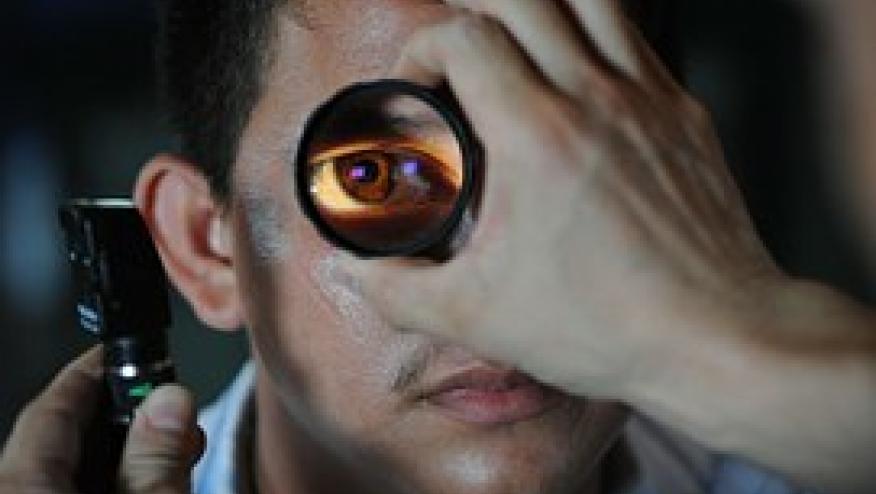Blinded by the Use of Antimalarials in Lupus? Save

Editor's note: July 1 - 5, RheumNow is running the best of EULAR 2019 meeting. Hydroxychloroquine (HCQ) will decrease SLE flares improve lipids, decrease clots, improve survival, augment the response to mycophenolate and are the cornerstone of treatment as per the SLE EULAR guidelines presented at EULAR 2019 in Madrid and also published in ARD. But, if you prescribe them long term, will your patients go blind?
How common is retinal toxicity from HCQ in SLE? One presentation with a chart audit by Laverty et al in Belfast (FRI0200) found retinal toxicity thought to be due to HCQ in 2/151 (1.3%) but only 25% had SLE and nearly 80% were receiving only 200 mg daily so this could be an under-ascertainment of the chance of toxicity in higher doses used for years in SLE patients.
Central macular retinopathy does occur with use of HCQ and risk factors include total cumulative dose, high daily dose, long term use, renal impairment, SLE vs. RA (possibly due to longer use, more renal issues, etc). The Hopkins SLE cohort and others presented some data about HCQ, retinal toxicity and screening (FRI0182, FRI0206, FRI0190). Petri et al found more retinal toxicity with age (<45 years the prevalence was 0.5% and 10% at age >60). This could be confounded by other causes of macular changes (macular degeneration) but is likely a higher cumulative dose effect and/or related to renal clearance with age related renal impairment. Petri’s group showed a correlation between HCQ dose and blood levels that was positive but not strong, and they suggested blood level monitoring could reduce HCQ toxicity as retinopathy increased from 1.2% to 6.7% between the lowest and highest tertile of blood level of HCQ. The prevalcne of retinal toxicity overall was 1% in less than 5 years, 6 to 10 years 1.8%, 11 to 15 years 3.3%, 16 or more years up to 11.5%.
Recommendations for HCQ screening vary but in the US are a baseline and then at 5 years to screen annually due to the rare chance of ocular toxicity (Bull’s eye retinopathy). Screening is usually visual field testing and one other test such as Ocular Coherence Tomography (OCT) which is very sensitive to detect macular changes.
So, practically speaking, here is what I do.
-
Once I know the patient will tolerate HCQ, within the first year send for a retinal assessment with visual fields and OCT.
-
Then repeat screening via country recommendations (ex. in US, baseline and then annually at 5 years and beyond)if the patient is still using HCQ.
-
Limit the dose to 5 mg/kg/d and consider tapering to lower dose in long term use (without any data on the latter statement).
-
Decrease dose if renal impairment or older age and consider doing HCQ levels. I don’t know when to do them and how often but HCQ toxicity is serious if up to 1 in 10 can have retinal damage in the long users (affecting their central vision so they can’t read, drive, etc).
-
I am alerted if a patient states they have halos at night, can’t read signs in poor lighting or changes in colour vision and send quickly for a retinal exam with above tests.
-
If a HCQ retinal screen is abnormal (it should be central vision changes and bilateral) I refer to a retina specialist to confirm or not and to co-manage with me and their other eye specialist.
Remember that if there is HCQ toxicity in the eye, it can progress as rods and cones can be permanently damaged. We must weigh the risks of HCQ that is so beneficial in SLE with 15 or more years of use of HCQ and try to minimize harm while maximizing benefit.










If you are a health practitioner, you may Login/Register to comment.
Due to the nature of these comment forums, only health practitioners are allowed to comment at this time.